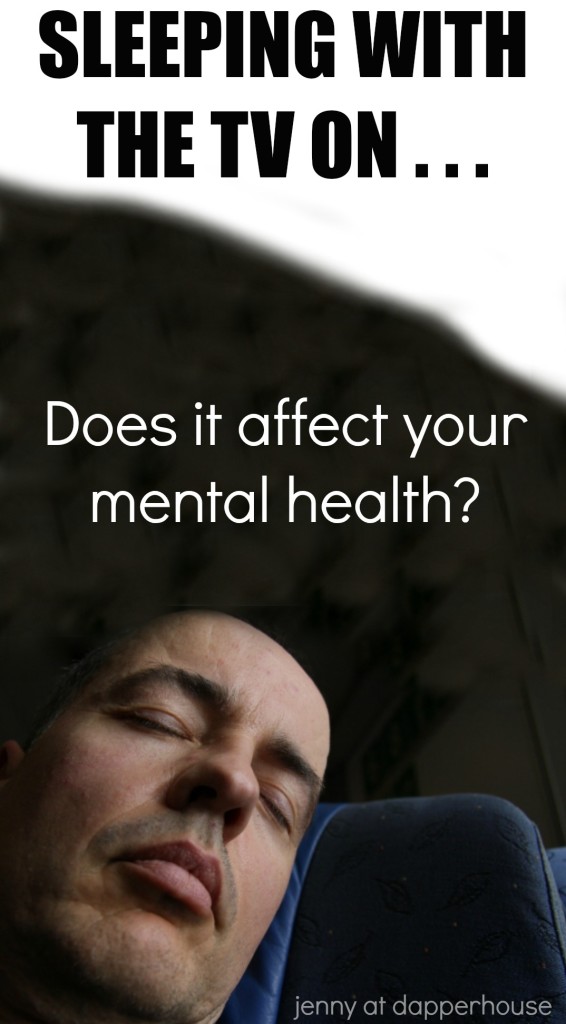Sleeping with the TV on, good or bad for mental health?
Many people fall asleep with the TV on. Some people do this because it keeps them from thinking about things that would keep them awake. Others do it because the dim light lulls them to sleep. It doesn’t matter why you keep the TV on during the night. Recent studies have discovered a bad connection with dim lights and several serious problems.

The Studies
While the recent scientific studies have been on rodents such as hamsters, rats and rabbits, there has been a definite link to depression and dim lights during sleep in humans.
Most studies took two groups of animals and exposed them to different environments while sleeping. One group is exposed to dim lights and the other has complete darkness. The group with the dim lights has lower brain activity, gives up on activities before the other group and has been shown to partake less in enjoyable activities.
Hippocampus Activity
The hippocampus is an important part of the brain that is responsible for spatial memory, memory in general and it is connected to other portions of the brain that are responsible for emotional thinking. The hippocampus undergoes many changes and experiences a lot of activity during sleep. There should be many nerves firing and responding during sleep for proper mental health.
The studies listed above found that the group exposed to dim lights had much less activity in this area of the brain. The hippocampus also tends to lose some density because there are fewer nerves after longer exposures to dim light.
Potential Problems
The most common problem linked to sleeping with the TV on is depression. Every study found that the experimental group of animals was less willing to engage in any activity. This is also consistent with human physiology because people with depression have been found to have less hippocampus activity than those without this condition.
Researchers are also suggesting that other problems might occur from sleeping with the TV on. One of the most reasonable problem is weight gain. This is mostly because the experimental group didn’t get the same amount of restful sleep as the control group. Both people and animals with sleep deprivation tend to eat more to ensure that they have enough energy to get through the day.
The two other problems that have been observed in experimental groups are an increased chance of breast cancer and sleep problems. Researchers aren’t sure yet why breast cancer is more likely to occur, but the advancement of sleep problems seems fairly obvious. Animals exposed to dim light often have a difficult time sleeping in darkness for several weeks or months.
Any Light
While the TV is the most common device responsible for exposing people to dim lights while sleeping, these studies have found that any source of dim light is enough to cause the discovered problems. It can come from a ceiling light, smartphone, computer or even the sun.
If you want to avoid these problems, then you should sleep in total darkness.
Tips
If you are used to sleeping with the TV on, then it might be hard to get restful sleep without it. Most people who do this need time before they can sleep in total darkness. Here are a few things that you can do to improve your sleep.
-Set the timer on your TV. While this will still expose you to dim lights, the exposure will be minimal.
-Wear an eye mask or get thicker shades if you commonly sleep during the day. This should keep you from being exposed to the light from the sun.
-Listen to music. While this will still expose you to some electromagnetic waves, the exposure is much less than keeping the TV on throughout the night.
Conclusion
Many people do find it easier to fall asleep with the TV on, but beware that many studies are find this linked to depression and other health problems. If you want the best sleep without worrying about developing undesired issues, then you need to start sleeping without the television.



Michelle
I’ve never been a TV sleeper. I used to know people who always fell asleep with the TV on, but I can’t intentionally. I would think that it would disrupt something. This article totally makes sense, but it’s really weird that it would be connected to breast cancer. Good info to have!
Nikki Muroski
My hubby says he “has” to fall asleep with the tv on…I prefer to shut it off because it wakes me up in the middle of the night since it’s super loud! This was great info, thanks!!
Mom Blog
My husband is a tv sleeper so that makes me one too:)
Bobbie Anne
Michele
I watch TV in the living room and will occasionally doze off–I do sleep in almost total darkness–I like to watch the moon as it crosses the night sky! Interesting study. Thank you for bring it to my attention.
Tess
I can’t sleep with the tv on so I always make sure to turn it off and it saves electric bill too.
Lynda Natale
I am horrible I need noise when I sleep and if my DH shuts the TV off if I awake in the middle of the night I turn it back on and usually will stay up and watch a bit until I fall back to sleep. My son is almost 6 and has now started doing the same with his music since he has no TV in his room
Michele Ertter Brosius
We have been married for 25 years and have never had a TV in our bedroom. BUT all of our children have TVs and have been TV sleepers from teen on up. I need them to read this article Thanks!
Maria Iemma
I must confess our TV is on all night — we cannot sleep without it. I will discuss your post with my husband and perhaps we can wean ourselves off.